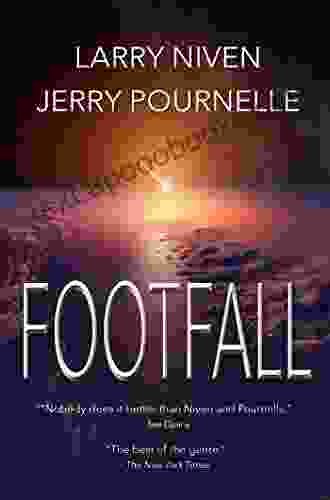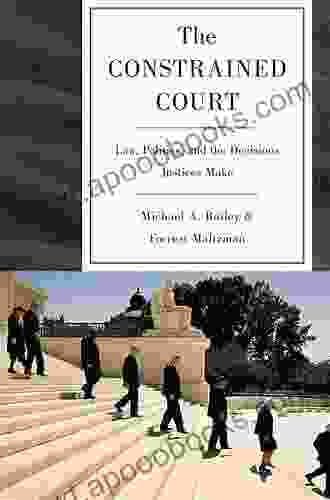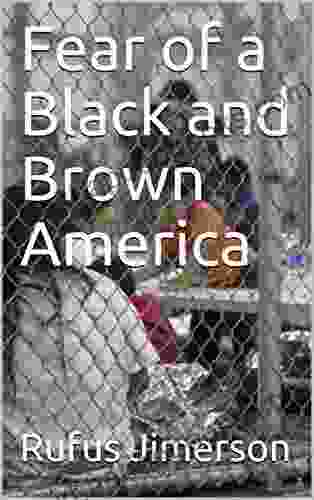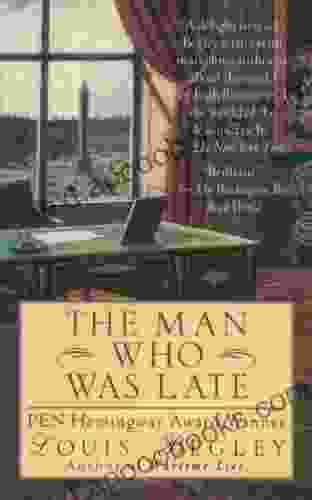Law, Politics, and the Decisions Justices Make: A Comprehensive Analysis

The relationship between law, politics, and the decisions justices make is a complex and multifaceted one. Legal principles, political ideologies, and social factors all play a role in shaping the decisions that judges and justices make. In this article, we will explore this relationship in detail, examining how each of these factors influences judicial outcomes.
Legal Principles
Legal principles are the foundation of judicial decision-making. These principles are derived from a variety of sources, including statutes, regulations, case law, and the Constitution. When making a decision, judges and justices must first determine which legal principles are applicable to the case at hand. Once the applicable principles have been identified, the judge or justice must then apply these principles to the facts of the case in Free Download to reach a decision.
4.6 out of 5
| Language | : | English |
| File size | : | 3511 KB |
| Text-to-Speech | : | Enabled |
| Screen Reader | : | Supported |
| Enhanced typesetting | : | Enabled |
| Word Wise | : | Enabled |
| Print length | : | 216 pages |
The application of legal principles to the facts of a case is not always straightforward. In many cases, there is more than one way to interpret the applicable principles. When this is the case, the judge or justice must exercise his or her discretion in Free Download to reach a decision. This is where politics and social factors can come into play.
Political Ideologies
Political ideologies are another important factor that can influence judicial decision-making. Judges and justices are human beings, and they bring their own political beliefs and values to the bench. These beliefs and values can shape how they interpret legal principles and apply them to the facts of a case.
For example, a judge who is a conservative may be more likely to interpret the Constitution in a way that favors individual liberty. A judge who is a liberal, on the other hand, may be more likely to interpret the Constitution in a way that favors social equality. Of course, there is no one-size-fits-all approach to judicial decision-making. Judges and justices must consider the specific facts of each case before making a decision.
Social Factors
In addition to legal principles and political ideologies, social factors can also influence judicial decision-making. These factors include things like the race, gender, and socioeconomic status of the parties involved in the case. Social factors can also include the public opinion on the issue at hand.
For example, a judge who is aware that the public is strongly in favor of a particular outcome may be more likely to rule in favor of that outcome, even if the legal principles do not support it. Similarly, a judge who is aware that a particular party is from a marginalized group may be more likely to rule in favor of that party, even if the legal principles do not support it.
The relationship between law, politics, and the decisions justices make is a complex and multifaceted one. Legal principles, political ideologies, and social factors all play a role in shaping the decisions that judges and justices make. In this article, we have explored this relationship in detail, examining how each of these factors influences judicial outcomes.
It is important to note that there is no one-size-fits-all approach to judicial decision-making. Judges and justices must consider the specific facts of each case before making a decision. However, the factors discussed in this article provide a framework for understanding how law, politics, and social factors influence judicial outcomes.
4.6 out of 5
| Language | : | English |
| File size | : | 3511 KB |
| Text-to-Speech | : | Enabled |
| Screen Reader | : | Supported |
| Enhanced typesetting | : | Enabled |
| Word Wise | : | Enabled |
| Print length | : | 216 pages |
Do you want to contribute by writing guest posts on this blog?
Please contact us and send us a resume of previous articles that you have written.
 Book
Book Novel
Novel Page
Page Chapter
Chapter Text
Text Story
Story Genre
Genre Reader
Reader Library
Library Paperback
Paperback E-book
E-book Magazine
Magazine Newspaper
Newspaper Paragraph
Paragraph Sentence
Sentence Bookmark
Bookmark Shelf
Shelf Glossary
Glossary Bibliography
Bibliography Foreword
Foreword Preface
Preface Synopsis
Synopsis Annotation
Annotation Footnote
Footnote Manuscript
Manuscript Scroll
Scroll Codex
Codex Tome
Tome Bestseller
Bestseller Classics
Classics Library card
Library card Narrative
Narrative Biography
Biography Autobiography
Autobiography Memoir
Memoir Reference
Reference Encyclopedia
Encyclopedia Piers Brendon
Piers Brendon Walter Crane
Walter Crane Klaus Metzger
Klaus Metzger Mark Steinberg
Mark Steinberg Kyeyoung Park
Kyeyoung Park Kristie Lynn Higgins
Kristie Lynn Higgins Lara Medina
Lara Medina Lisa Whelchel
Lisa Whelchel L D Sewell
L D Sewell Spencer P Morrison
Spencer P Morrison Mark Rozzo
Mark Rozzo Rachel Wesson
Rachel Wesson Vikram Roy
Vikram Roy Knitting Academy
Knitting Academy Melanie Hernandez
Melanie Hernandez Michael Chatfield
Michael Chatfield Peggy House
Peggy House Leah Weiss
Leah Weiss Larry Niven
Larry Niven Patricia W Fischer
Patricia W Fischer
Light bulbAdvertise smarter! Our strategic ad space ensures maximum exposure. Reserve your spot today!

 Fredrick CoxUnveiling the Enigmatic World of Poems Murphy: An Immersive Journey into the...
Fredrick CoxUnveiling the Enigmatic World of Poems Murphy: An Immersive Journey into the... D'Angelo CarterFollow ·8.4k
D'Angelo CarterFollow ·8.4k Junichiro TanizakiFollow ·5.9k
Junichiro TanizakiFollow ·5.9k Evan SimmonsFollow ·3k
Evan SimmonsFollow ·3k Paulo CoelhoFollow ·10.4k
Paulo CoelhoFollow ·10.4k Melvin BlairFollow ·6.5k
Melvin BlairFollow ·6.5k Aaron BrooksFollow ·17.7k
Aaron BrooksFollow ·17.7k Foster HayesFollow ·5.7k
Foster HayesFollow ·5.7k Marcel ProustFollow ·11.2k
Marcel ProustFollow ·11.2k

 Henry Wadsworth Longfellow
Henry Wadsworth LongfellowUnleash the Blues Spirit: Dive into "Blues Guitar Songs...
The captivating allure of the blues has...

 Ernesto Sabato
Ernesto SabatoBehind the Scenes with the Legends of Beauty
Unveiling the...

 Neal Ward
Neal WardUnleash the Infernal Power of "Lucifer's Hammer" by Larry...
A Cosmic Catastrophe that Will Ignite Your...

 Wesley Reed
Wesley ReedPetra Pecado: A Gripping and Unforgettable Journey...
Embark on a Captivating Adventure ...

 Phil Foster
Phil FosterStep into a World of Wonders: Footfall by Larry Niven - A...
Prologue: In the vast expanse of the...
4.6 out of 5
| Language | : | English |
| File size | : | 3511 KB |
| Text-to-Speech | : | Enabled |
| Screen Reader | : | Supported |
| Enhanced typesetting | : | Enabled |
| Word Wise | : | Enabled |
| Print length | : | 216 pages |












